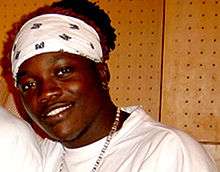Dully Sykes
| Dully Sykes | |
|---|---|
 Dully Sykes | |
| Background information | |
| Birth name | Abdul Sykes |
| Also known as | Mr. Misifa |
| Born |
4 December 1980 Dar es Salaam, Tanzania |
| Occupation(s) | Singer . record producer |
| Years active | 1999–present |
| Labels | Dhahabu Records |
| Associated acts |
Diamond Platnumz, Ommy Dimpoz, Joslin, Nash Y, Professor Jay, Ngwair, Ali Kiba |
Dully Sykes (born Abdul Sykes on 4 December 1980)[1] is a Tanzanian musician and he also knows by the founder of Bongo Flava genre in Tanzania.
Biography
Also known as Mr Misifa or Mr Chicks, Dully Sykes is a dancehall artist in Tanzania. He has performed in the UK.[2] Following the footsteps of his father Ebby Sykes, a "Manu Dibango-type musician", Sykes is one of the pioneers of Swahili dancehall in the African Great Lakes region, and is widely known for hits like "Julieta", "Salome", "Historia ya Kweli" and "Leah". Some of his songs are based on true stories. After the first album, Historia ya kweli released in 2003, people started calling his music mwanasesele, Swahili for a high squeaky noise. With the song "Handsome" and an album by the same name, he became one of the biggest names in young urban music in Tanzania. With his third album, he proved that he is not only a singer but a fully-fledged musician by mixing different music styles showing his versatility, without compromising or changing his unique African voice. He has produced music at his Dar es Salaam record label called. Dhahabu Records, and continues to write songs. He has provided "hooks" to many artists including Man X's "Nimechezea Bahati" and P-Funk's "Please Forgive Me". One of his tracks, "Handsome", is on the African Rebel Music Roots reggae and dancehall CD compiled by the international record label, Out Here Records. Dully is no stranger to controversy or the gossip columns of newspapers. From being caught by traffic police driving a mini-bus when he was 12 to using pepper-spray at a concert after having a row with the boyfriend of a girl he was flirting with, newspapers always have something to talk about.
Nyambizi and controversy
Sykes has also attracted criticism for his lyrical content and the images in his videos. To date, his most controversial song in probably "Nyambiz", a tale of his sexual experiences with a "nyambizi", slang for a large voluptuous woman. Released as a single in 2001, the song was attacked by various organisations for its lewd lyrics."[3] In response to the public outlash, radio stations refused to play the song, but it nevertheless continued to be requested by radio listeners and the single sold well.[3] Sykes' music videos has also attracted criticism.
Discography
- Historia ya Kweli(2003)
- Handsome(2004)
- Hunifahamu(2005)
Compilations
- Bongo Hottest Flavas: Volume 1
- Ndani ya Bongo: Volume 1
- Kwa Fujo Deejayz: Volume 1
- Kwa Fujo Deejayz: Ladha Zaidi
- Kwa Fujo Deejayz: Mlipuko wa Bongo Cuts
- Gede Records: Pasua Kichwa
- Bongo Halisi (2004)
- G-Project: Bongo Project Volume 1 (2005)
- Fungua Mwaka 2005 (2005)
- Pamoja Ndani Ya Game (2006)
- African Rebel Music: "Roots, Reggae and Dancehall" (2006)
Awards
Won
- 2011 Tanzania Music Awards – Best Video and Best Ragga/Dancehall Song ("Action" with CPWAA, Ms. Triniti & Mangwair)[4][5]
- 2012 Tanzania Music Awards – Best Ragga/Dancehall Song ("Maneno Maneno" with Queen Darleen)
Nominations
- 2004 Tanzania Music Awards – Best Hip Hop Album (Handsome)[6]
- 2007 Tanzania Music Awards – Best collaboration ("Dhahabu" with Joslin and Mr. Blue)[7]
- 2008 Tanzania Music Awards – Best Reggae/Ragga Song ("Baby Candy")[8]
- 2010 Tanzania music awards – Best Ragga/Dancehall Song ("Shikide")
- 2012 Tanzania Music Awards – Best Male Artist, Best Video ("Bongo flava"), Best Afro Pop Song ("Bongo flava")[9][10]
References
- ↑ Dully Sykes born 4 December, 1980 – his facebook profile
- ↑ "BBC - Africa Beyond". bbc.co.uk.
- 1 2 Lemelle, Sidney J. "'Ni wapi Tunakwenda': Hip Hop Culture and the Children of Arusha" in The Vinyl Ain't Final: Hip Hop and the Globalization of Black Popular Culture, ed. Dipannita Basu and Sidney J. Lemelle, 230-54. London; Ann Arbor, MI: Pluto Press
- ↑ allAfrica.com: "20 Percent" Bags Five Tanzania Music Awards
- ↑ allAfrica.com: Kili Night of Fun, Awards And Much More
- ↑ "Tanzania Music Awards – Nominees 2004]". archive.org. 4 December 2004. Archived from the original on 4 December 2004.
- ↑ "Tanzania Music Awards – 2007 Nominees". kilitimetz.com.
- ↑ Freemedia.co.tz: Kili Music Awards 2007 yafana, wengi wakubali matokeo
- ↑ allAfrica.com: Diamond Lands Seven Kili Music Awards Nominations 9 February 2012
- ↑ Bongo5.com: Kili awards 2012 Nominees hawa hapa! 8 February 2012
External links
- Dully Sykes at MySpace